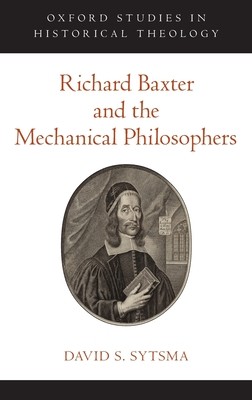
- We will send in 10–14 business days.
- Author: David S Sytsma
- Publisher: Oxford University Press, USA
- ISBN-10: 0190274875
- ISBN-13: 9780190274870
- Format: 15.5 x 23.6 x 2 cm, hardcover
- Language: English
- SAVE -10% with code: EXTRA
Reviews
Description
Richard Baxter, one of the most famous Puritans of the seventeenth century, is generally known as a writer of practical and devotional literature. But he also excelled in knowledge of medieval and early modern scholastic theology, and was conversant with a wide variety of seventeenth-century philosophies. Baxter was among the early English polemicists who wrote against the mechanical philosophy of René Descartes and Pierre Gassendi in the years immediately following the establishment of the Royal Society. At the same time, he was friends with Robert Boyle and Matthew Hale, corresponded with Joseph Glanvill, and engaged in philosophical controversy with Henry More. In this book, David Sytsma presents a chronological and thematic account of Baxter's relation to the people and concepts involved in the rise of mechanical philosophy in late-seventeenth-century England. Drawing on largely unexamined works, including Baxter's Methodus Theologiae Christianae (1681) and manuscript treatises and correspondence, Sytsma discusses Baxter's response to mechanical philosophers on the nature of substance, laws of motion, the soul, and ethics. Analysis of these topics is framed by a consideration of the growth of Christian Epicureanism in England, Baxter's overall approach to reason and philosophy, and his attempt to understand creation as an analogical reflection of God's power, wisdom, and goodness, or vestigia Trinitatis. Baxter's views on reason, analogical knowledge of God, and vestigia Trinitatis draw on medieval precedents and directly inform a largely hostile, though partially accommodating, response to mechanical philosophy.
EXTRA 10 % discount with code: EXTRA
The promotion ends in 18d.10:19:28
The discount code is valid when purchasing from 10 €. Discounts do not stack.
- Author: David S Sytsma
- Publisher: Oxford University Press, USA
- ISBN-10: 0190274875
- ISBN-13: 9780190274870
- Format: 15.5 x 23.6 x 2 cm, hardcover
- Language: English English
Richard Baxter, one of the most famous Puritans of the seventeenth century, is generally known as a writer of practical and devotional literature. But he also excelled in knowledge of medieval and early modern scholastic theology, and was conversant with a wide variety of seventeenth-century philosophies. Baxter was among the early English polemicists who wrote against the mechanical philosophy of René Descartes and Pierre Gassendi in the years immediately following the establishment of the Royal Society. At the same time, he was friends with Robert Boyle and Matthew Hale, corresponded with Joseph Glanvill, and engaged in philosophical controversy with Henry More. In this book, David Sytsma presents a chronological and thematic account of Baxter's relation to the people and concepts involved in the rise of mechanical philosophy in late-seventeenth-century England. Drawing on largely unexamined works, including Baxter's Methodus Theologiae Christianae (1681) and manuscript treatises and correspondence, Sytsma discusses Baxter's response to mechanical philosophers on the nature of substance, laws of motion, the soul, and ethics. Analysis of these topics is framed by a consideration of the growth of Christian Epicureanism in England, Baxter's overall approach to reason and philosophy, and his attempt to understand creation as an analogical reflection of God's power, wisdom, and goodness, or vestigia Trinitatis. Baxter's views on reason, analogical knowledge of God, and vestigia Trinitatis draw on medieval precedents and directly inform a largely hostile, though partially accommodating, response to mechanical philosophy.


Reviews